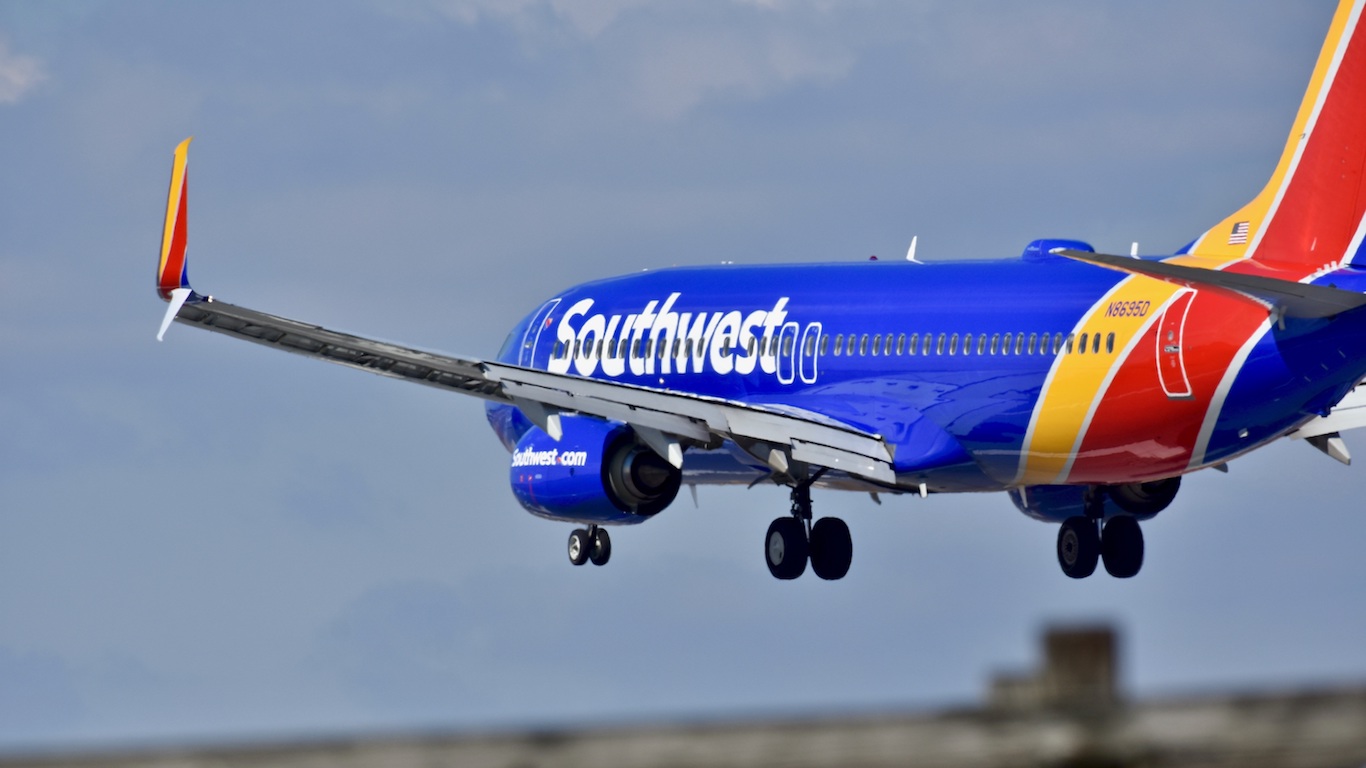
In an airline industry note from Raymond James Thursday morning, analyst Savanthi Syth added Southwest Airlines Co. (NYSE: LUV) to her short list of U.S. airlines rated as a Strong Buy. At the same time, she downgraded Alaska Air Group Inc. (NYSE: ALK) from Strong Buy to Outperform and upgraded Frontier Group Holdings Inc. (NASDAQ: ULCC) from Market Perform to Outperform.
Syth based her Southwest upgrade on the company’s recent guidance update in which Southwest reiterated its strong 2022 earnings outlook and an expectation for profitability in the second half of this year and for the full 2022 fiscal year. Not a small achievement given the airline’s first-quarter loss of $278 million.
She also cited Southwest’s strong passenger bookings and strong yields for April and May that have continued into June. Southwest also reiterated its full-year capacity estimate of down 4% compared to 2019 capacity. For Syth, that implies that the airline’s capacity in the second half of 2022 will be flat with the same period in 2019.
Fuel costs for the year are expected to average $3.30 to $3.40 per gallon, the lowest of any airline in Raymond James’s coverage. The other Strong Buy-rated airline in the firm’s coverage is Delta Air Lines Co. (NYSE: DAL) with an average fuel cost of $3.60 to $3.70.
In addition to the rating changes, Syth also lowered her price targets on four firms and set a price target on a fifth.
Frontier’s price target was set at $14, reflecting Syth’s view that “JetBlue is going to be successful in its bid for Spirit.” In other words, losing the bidding war for Spirit is good news for Frontier’s investors. At a recent trading price of $9.82, the upside potential on the stock is 44%.
Southwest’s price target was reduced by 4%, from $57 to $55, implying a potential gain of 54%. Syth noted that Southwest owns the industry’s best balance sheet and it has ordered new airplanes at a very good price. She also thinks Southwest “even improve as current initiatives should enable it to capture a greater share of corporate revenue (relative to 2019 levels), including through up-sell.”
Syth cut Alaska’s price target from $75 to $58, a drop of 23%. The potential upside to the new target is 44%, however. She sees “elevated cost risk” in Alaska’s transition from an Airbus fleet of A320s to Boeing 737s and Embraer regional jets. A potential upside for the airline is more demand from West Coast business travel and new international revenue.
Raymond James lowered its price target on United Airlines Holdings Inc. (NASDAQ: UAL) by 23%, from $62 to $48. At Wednesday’s closing price of $36.72, the implied gain to the new target is 31%. A rise in international travel since pandemic restrictions were lifted and lower exposure to labor and cost constraints combine to justify a “compelling risk-reward” calculation and United’s Outperform rating.
The Delta Air Lines price target was cut by 6%, from $53 to $50. At a recent price of $30, the upside potential based on the new target is 67%. The airline’s Strong Buy rating is based on its relatively lower debt load compared to American Airlines, its lack of an expensive order book compared to United, its history of balanced capital deployment and other structural advantages. Delta also owns its own oil refinery, which the airline expects to yield a benefit of about $0.37 per gallon in the second quarter.
In 20 Years, I Haven’t Seen A Cash Back Card This Good
After two decades of reviewing financial products I haven’t seen anything like this. Credit card companies are at war, handing out free rewards and benefits to win the best customers.
A good cash back card can be worth thousands of dollars a year in free money, not to mention other perks like travel, insurance, and access to fancy lounges.
Our top pick today pays up to 5% cash back, a $200 bonus on top, and $0 annual fee. Click here to apply before they stop offering rewards this generous.
Flywheel Publishing has partnered with CardRatings for our coverage of credit card products. Flywheel Publishing and CardRatings may receive a commission from card issuers.
Thank you for reading! Have some feedback for us?
Contact the 24/7 Wall St. editorial team.

 24/7 Wall St.
24/7 Wall St.



